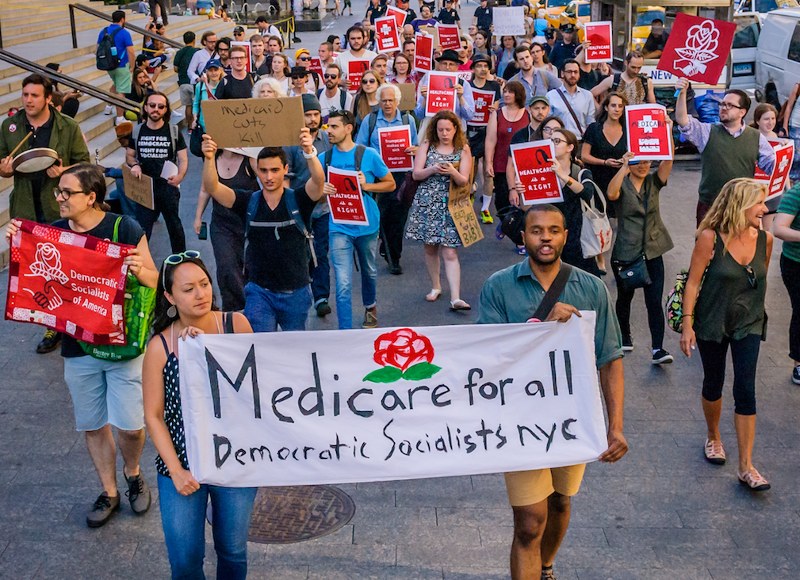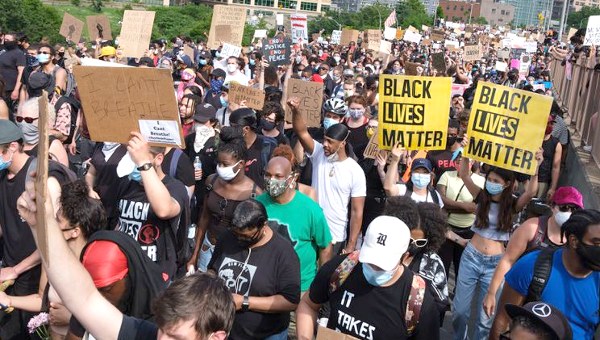Trump May Be Gone, But Neofascism Remains
At last, the Donald Trump Presidency has crash landed and he is out of the White House. Now, we can all start dealing with ‘Trump trauma’ and shock. What did we live through over the past four years? This is a planetary question. It is a question we are all grappling with because the world is now capitalist on a global scale and America is the leading power making that world. Post the Cold War we were all conscripted to be Americans and the ‘American Dream’ was declared the global dream. Even China bought into it through its own self interested and authoritarian way. They became so good at it then even Trump baulked. He wanted it back and declared: “Make America Great Again.”
While we do not physically live in America, through the global media we are front-row spectators gazing into it, watching the theatrics of its leaders while grappling with its presence in our everyday lives. The US has set the standards of ‘civilization’ by asserting a set of universals – democracy, progress, competition, individualism and free enterprise. These universals are the props of a mythic America, standing tall at the vanguard of the ‘free world’, and which reveals itself through the iconic hamburger, unthinking patriotism, voting in elections, the veneration of a masculine gun culture, Hollywood movies and mass consumption.

This idealized liberal version of America and its material roots is what Trump remade. He could do this because he exploited one of the most fatal flaws of US democracy: the over concentration of power in the US Presidency and the cult-like aura that surrounds this political institution. This weakness exists despite the constitutional separation of powers and Trump ably demonstrated this. One individual controlling the world’s most deadly nuclear arsenal, a powerful communications megaphone, commander of the military, imbued with a veto against Congress and extensive Executive Power, including for extra judicial killing anywhere in the world, got busy wrecking everything since his election in 2016.
Rising to the Top of the System
At times, with his racist utterances he looked like Hitler, and at other times, in his anti-democratic performances like Stalin. A Trumpian Presidency also demonstrated how an anti-democratic, neo-fascist, could use the weaknesses of a corporate controlled market democracy to rise to the apex of the US political system. Money, exclusionary nationalism, a sympathetic right-wing media and an effective social media strategy easily secured entry into the White House. This is not unique to the US but has become a feature of many market democracies in the global north and south.
The third wave of democratization (1973 – to the mid 2000s), based on American liberal universals, has been halting. As it plunges into crisis all over the world, it is giving rise to a second coming of fascism including in India (the largest democracy in the world) and Brazil (the largest democracy in Latin America). Inequalities have broken market democracies and ritual voting every few years for more of the same pro-business policies is breeding deadly divides across precarious societies. COVID-19 has only made this all worse.
Beyond mythic America and Dow Jones economic performance indicators is an extremely divided country. Since the 1970s, corporate America started pushing harder to end the US social contract that provided certain minimum social protections. Ronald Reagan’s unleashing of corporate power, coded racism (referred to in the mainstream as Republican conservatism) and renewed Cold War competition paved the way for Bill Clinton to entrench the power of US corporate finance into every nook and cranny of US life. This also provided the institutional basis for global corporate finance, centred on the Dollar and Wall Street, to shape deepening globalization.
In this expansionist economic tide there were winners and losers. The winners are the super-wealthy plutocrats. In 1965, an average CEO salary was forty times as much as the average wage; today that number is more than 300 times as much. Today, the top 5 per cent of households possess nearly 75 per cent of the nation’s wealth, while the bottom 60 per cent of American households have lost wealth. Unionization of the American workforce played a crucial redistributive role but this has declined from a high of more than 30 per cent in the mid-1950s to fewer than 10 per cent today. In this fragile society dramatic shocks easily reveal its underbelly. For instance, Hurricane Katrina in 2005 brought home vividly racial exclusion and wealth disparities in New Orleans. Moreover, the great financial crash of 2007-2009 exacerbated inequalities, as finance houses where bailed out and the precariat of American society lost homes and jobs. Barrack Obama and the Democratic Party did very little to change the direction of American society and deep social fault-lines widened.
Some Context
The Trumpian response has to be located in this context. It was a right-wing challenge to the hypocrisy of liberal nationalism and internationalism. Trumpism was about revanchist nationalism, to regain lost ground for white Anglo-Saxon supremacy, while drawing from deep wells of anti-intellectualism and discontent within American society. He was the strong man in the White House, in the age of social media, who was going to build walls, persecute the children of immigrants, crank up Islamaphobia and crush protests in defense of Black lives. In geopolitical terms he was also readjusting relations with trans-Atlantic allies and China to affirm a crude version of US transactional unilateralism, something which Democrats cloak in multilateralism.
Trump was doing all of this while keeping American capitalism going to keep plutocratic America happy. Tax cuts for the rich, Wall Street finance flowing, elite Charter Schools, enabling fossil fuel extraction, promoting climate denialism and asserting an anti-science approach to COVID-19. On the latter, Trump was demonstrating to the world a misguided libertarian individualism, with rejecting mask wearing as more important than the common good. Trump was the unapologetic and arrogant white male capitalist political ruler. In the context of the Republican Party, despite a few individual noises and divergences, Trumpism resonated because it amplified what was inside the Republican Party.
The American dream in this narrative is about a plutocratic white America being able to do what it wants despite the formality of democracy. Trump confirmed this with his cabinet appointments which included several billionaires, millionaires and centimillonaires. For Trump, wealth, privilege, and power was even license to invent reality as he saw fit. Thus any divergence from his worldview and interests were ‘fake news’. Trump ensured the plutocratic wealthy were no longer in the political shadows but now in the mainstream. This political reality essentially short circuited the Washington beltway, with its patronage wheels greased by mega business lobbies to buy out policies and regulation. Wealthy plutocrats were now directly in charge and at the apex of the state. This in turn constituted corporate power as the definitive marker of whiteness and the market as freedom. About 74 million who voted for Trump believe the same and this makes neo-fascism a living political phenomena in the mainstream of American society, even if Trump disappears.
On January 6th, the storming of the Capitol was a desperate plutocratic move Trumpism played to affirm its anti-democratic credentials. This moment of infamy was very similar to scenes in many parts of the world as the crisis of market democracies worsens. In the American context it flipped the narrative of the Muslim fundamentalist terrorist as being the barbarian at the gates to homegrown white neo-fascism. At the same time, the American standard of democracy, with its hypocrisy, exclusions and limits was rendered visible. It ended a propagandistic myth of the perfect democracy cultivated since the end of World War 2, through the McCarthy red baiting period, Cold War destabilization of many countries and in the era of corporate led globalization. The scary fact lurking in all of this is 139 Republican representatives (66% of the caucus in the House) and 8 Republican Senators voted to over-turn the recent national election. Stealing the election was a consistent agenda that united Trump, the mob and the majority in the Republican Party. This was further affirmed when only a small minority (10 out of 211 Republican representatives) voted in favor of the second impeachment of Trump.
The Joe Biden led Democratic Party is off to a good start to criminalize the mob violence but a narrow law and order approach is not going to solve the deep divides wrenching American society apart. Trumpian white supremacists and plutocratic elites can be securitized to ensure political management and old style deal making can kick in to divide the Trumpian support base but this is not new in America. This has been happening to African Americans since the civil rights victories of the mid-1960s: incorporation for some, exclusion, securitization and incarceration for the many. As a result the real challenge of the racial divide was not addressed.

America needs a new nation building project that addresses the deep roots of crisis. An immediate priority is ending COVID-19 devastation and policy failures. However, beyond the pandemic nothing short of a new constitution, electoral reforms which removes corporate financial influence, including a break with the two party system and the outdated Electoral College, climate change economic policies that are transformative, progressive immigration policies, tight gun control laws, democratic regulation of social media corporations and international relations that respects societies that democratically choose not to be like America, could lay the basis for renewal. Biden’s Democratic Party faces this historical test. If it fails in this task the world should expect further decay and social conflict in American society as it declines as a post-hegemonic power. •
This is an expanded version of an article first published by the Sunday Times.





